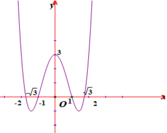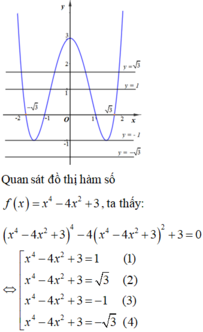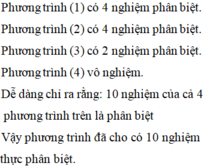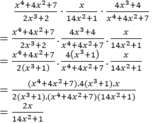Tìm GTNN của A = 4x4 + 4x2 - 3
Hãy nhập câu hỏi của bạn vào đây, nếu là tài khoản VIP, bạn sẽ được ưu tiên trả lời.


d. A(x) = M(x) + 2N(x)
= 10x3 + 5x2 - 4x - 1 + 2(x2 - 9)
= 10x3 + 7x2 - 4x - 19 (0.5 điểm)
Thay x = 1 vào biểu thức ta có: A(1) = -6 (0.5 điểm)

a. Rút gọn và sắp xếp
P(x) = -5x3 - 2x + 4x4 + 3 + 3x2 - 4x4 + 10x3 - 8
= 5x3 + 3x2-2x-5 (0.75 điểm)
Q(x) = 6x2 + 5x3 - 3x5 + 4 + 8x - 4x2 + 3x5 - 10x
= 5x3 + 2x2 - 2x + 4 (0.75 điểm)

c. x = 3, x = -3 có là nghiệm của N(x) vì N(3) = N(-3) = 0 (0.5 điểm)

\(A=4x^2-4x+19=4x^2+4x+1+18=\left(2x+1\right)^2+18\ge18\)
\(minA=18\Leftrightarrow2x-1=0\Leftrightarrow x=\dfrac{1}{2}\)
\(A=4x^2-4x+19\)
\(=4x^2-4x+1+18\)
\(=\left(2x-1\right)^2+18\ge18\forall x\)
Dấu '=' xảy ra khi \(x=\dfrac{1}{2}\)

Chọn đáp án B

Ta có
![]()

Quan sát đồ thị của hàm số y = f(x) ta thấy:
Phương trình f x = - 3 không có nghiệm; phương trình f x = - 1 có 2 nghiệm;
phương trình f x = 1 có 4 nghiệm; phương trình f x = 3 có 4 nghiệm.
Vậy phương trình x 4 - 4 x 2 + 3 2 - 4 x 4 - 4 x 2 + 3 2 + 3 = 0 có 10 nghiệm.

a) \(4x^2+12x+1=\left(4x^2+12x+9\right)-8=\left(2x+3\right)^2-8\ge-8\)
\(ĐTXR\Leftrightarrow x=-\dfrac{3}{2}\)
b) \(4x^2-3x+10=\left(4x^2-3x+\dfrac{9}{16}\right)+\dfrac{151}{16}=\left(2x-\dfrac{3}{4}\right)^2+\dfrac{151}{16}\ge\dfrac{151}{16}\)
\(ĐTXR\Leftrightarrow x=\dfrac{3}{8}\)
c) \(2x^2+5x+10=\left(2x^2+5x+\dfrac{25}{8}\right)+\dfrac{55}{8}=\left(\sqrt{2}x+\dfrac{5\sqrt{2}}{4}\right)^2+\dfrac{55}{8}\ge\dfrac{55}{8}\)
\(ĐTXR\Leftrightarrow x=-\dfrac{5}{4}\)
d) \(x-x^2+2=-\left(x^2-x+\dfrac{1}{4}\right)+\dfrac{9}{4}=-\left(x-\dfrac{1}{2}\right)^2+\dfrac{9}{4}\le\dfrac{9}{4}\)
\(ĐTXR\Leftrightarrow x=\dfrac{1}{2}\)
e) \(2x-2x^2=-2\left(x^2-x+\dfrac{1}{4}\right)+\dfrac{1}{2}=-2\left(x-\dfrac{1}{2}\right)^2+\dfrac{1}{2}\le\dfrac{1}{2}\)
\(ĐTXR\Leftrightarrow x=\dfrac{1}{2}\)
f) \(4x^2+2y^2+4xy+4y+5=\left(4x^2+4xy+y^2\right)+\left(y^2+4y+4\right)+1=\left(2x+y\right)^2+\left(y+2\right)^2+1\ge1\)
\(ĐTXR\Leftrightarrow\) \(\left\{{}\begin{matrix}x=1\\y=-2\end{matrix}\right.\)
a: Ta có: \(4x^2+12x+1\)
\(=4x^2+12x+9-8\)
\(=\left(2x+3\right)^2-8\ge-8\forall x\)
Dấu '=' xảy ra khi \(x=-\dfrac{3}{2}\)
b: Ta có: \(4x^2-3x+10\)
\(=4\left(x^2-\dfrac{3}{4}x+\dfrac{5}{2}\right)\)
\(=4\left(x^2-2\cdot x\cdot\dfrac{3}{8}+\dfrac{9}{64}+\dfrac{151}{64}\right)\)
\(=4\left(x-\dfrac{3}{8}\right)^2+\dfrac{151}{16}\ge\dfrac{151}{16}\forall x\)
Dấu '=' xảy ra khi \(x=\dfrac{3}{8}\)
c: Ta có: \(2x^2+5x+10\)
\(=2\left(x^2+\dfrac{5}{2}x+5\right)\)
\(=2\left(x^2+2\cdot x\cdot\dfrac{5}{4}+\dfrac{25}{16}+\dfrac{55}{16}\right)\)
\(=2\left(x+\dfrac{5}{4}\right)^2+\dfrac{55}{8}\ge\dfrac{55}{8}\forall x\)
Dấu '=' xảy ra khi \(x=-\dfrac{5}{4}\)

a)x2-6x+9
=x2-2.x.3+32
=(x-3)2
b)4x2+4x+1
=(2x)2+2.2x.1+12
=(2x+1)2
c)4x2+12xy+9y2
=(2x)2+2.2x.3y+(3y)2
=(2x+3y)2
d)4x4-4x2+4
=(2x2)2-2.2x2.2+22
=(2x2-2)2





\(A=4x^4+4x^2-3\)
\(A=\left[\left(2x^2\right)^2+2.2x^2.1+1^2\right]-4\)
\(A=\left(2x+1\right)^2-4\)
Ta có: \(\left(2x+1\right)^2\ge0\forall x\)
\(\Rightarrow\left(2x+1\right)^2-4\ge-4\forall x\)
\(A=-4\Leftrightarrow\left(2x+1\right)^2=0\Leftrightarrow x=-\frac{1}{2}\)
Vậy \(A_{min}=-4\Leftrightarrow x=-\frac{1}{2}\)